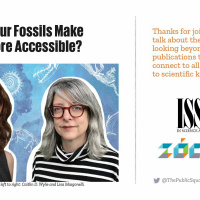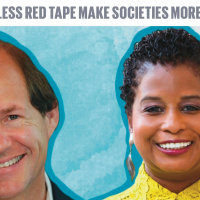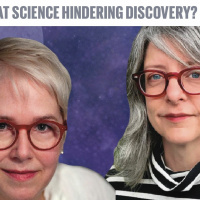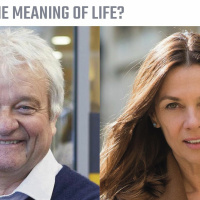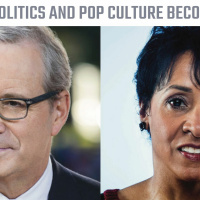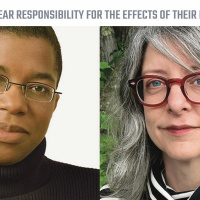Sinopsis
An innovative blend of ideas journalism and live events.
Episodios
-
Can Dinosaur Fossils Make Science More Accessible At Zócalo Public Square
03/12/2021 Duración: 01h02minUniversity of Virginia social scientist Caitlin Donahue Wylie, author of “Preparing Dinosaurs: The Work Behind the Scenes” and a new essay in “Issues in Science and Technology” on the topic, visits Zócalo to talk about the power of looking beyond Ph.D.s and publications to recognize and connect to all who contribute to scientific knowledge. Today’s Zócalo/Issues in Science and Technology event is moderated by Issues editor-in-chief Lisa Margonelli. Read more about our panelists here: https://zps.la/3cjL6OA For live captioning, please turn on the video’s caption feature. Visit https://www.zocalopublicsquare.org/ to read our articles and learn about upcoming events. Follow along on Twitter: https://twitter.com/thepublicsquare Instagram: https://www.instagram.com/thepublicsquare/ Facebook: https://www.facebook.com/zocalopublicsquare LinkedIn: https://www.linkedin.com/company/z-calo-public-square
-
Is There Still Merit in a Merit-Based System? at Zócalo Public Square
17/11/2021 Duración: 01h16sCalls are growing for the dismantling of the meritocracy—educational systems and economic structures that claim to elevate individuals based on merit, but instead favor those with wealth or racial privilege. As elites turn against the very merit-based systems that elevated them, governments, corporations, schools, and other entities are extending old policies—like affirmative action—and embracing new initiatives for equity and inclusion. But as we rid our society of standardized tests, “gifted” schools and programs, and traditional corporate hierarchies, finding new methods of evaluation and promotion is proving difficult. What value, if any, do the ideas of merit and merit-based decision-making retain in this moment of reassessment? What were the origins and intentions of those who created merit-based systems for scholarships and federal employment, and how have those systems fallen short? Do today’s profound social inequalities reflect a fundamental failure of the idea of meritocracy, or a corruption of an
-
Is it Time to Throw Away Our Resumes? at Zócalo Public Square
22/10/2021 Duración: 59minWe are failing Americans without college degrees. Research shows that up to 30 million workers without four-year degrees are drastically underpaid, and have the skills to earn 70 percent more than what they’re currently making. What accounts for this failure of the labor market? One problem is that traditional resumes don’t show or verify the full range of a worker’s skills—including those gained in the military and volunteer work, not to mention family businesses and caretaking. But there’s a promising digital fix that could help: learning and employment records. LERs are digital profiles that allow individuals to document their knowledge and skills, no matter how they were acquired—and have the potential to transform hiring while fueling innovation. What is an LER, and how can it be used to record everything you’ve ever learned? How can this technology be designed and implemented to create more jobs with good wages? And what will it take to design and implement LERs that make the labor market fairer to all
-
Will a New Generation of Leaders Shake Up L.A.’s Culture?
01/10/2021 Duración: 01h09minOver the past year, directors of cultural institutions across Los Angeles have announced their retirements, which means a new generation of cultural leadership is upon us. But despite a desire for change that seems nearly universal, new directors must still answer to many of the same funders and face the same pressures as their predecessors—to raise money or sell tickets, to scale up, to stay relevant—all while navigating post-pandemic reopenings and reckonings around race and inclusion. What does Los Angeles need from its new guard of cultural leaders? What obstacles do their institutions face, and how can these new faces surmount them? Will all of the city’s culture centers even survive? California African American Museum executive director Cameron Shaw, Inner-City Arts president and CEO Shelby Williams-González, and MAK Center for Art and Architecture director Jia Yi Gu visited Zócalo to discuss the change they plan to be and want to see in one of the world’s most vibrant cultural capitals. This Zócalo/H
-
How Could Less Red Tape Make Societies More Equal? at Zócalo Public Square
09/09/2021 Duración: 57minTo merely open a bank account or secure a driver’s license, people around the world face one common barrier: paperwork. Americans, in fact, spend 11.4 billion hours a year on federal paperwork alone. Harvard legal scholar Cass R. Sunstein, former administrator of the White House Office of Information and Regulatory Affairs, has a name for this kind of drudgery: sludge. Sludge, he argues, doesn’t just cost time, money, and dignity—it does an immense amount of damage to society’s most vulnerable people. Bureaucratic red tape—“volokita” as it’s known in Russian—hinders everything from gaining access to food to securing healthcare. How could less paperwork help the least wealthy, least healthy, and least educated improve their station in life? Have any countries or institutions figured out what it would take to make this happen? Sunstein, author most recently of “Sludge: What Stops Us from Getting Things Done and What to Do about It,” visited Zócalo to talk about eliminating the piles of paperwork obscuring our
-
Can California Help America Reduce Gun Violence?
20/08/2021 Duración: 01h05minThe United States has more firearms (390 million) than people (325 million), routinely experiences mass shootings, and suffers rates of gun violence far higher than other wealthy countries. California has touted itself as a safer model, with the most gun regulations in the country, the 44th lowest rate of gun violence among the 50 states, and a 9 percent decrease in gun deaths over the last decade, compared to an 18 percent increase nationwide. Has California—with its diverse mix of dense urban centers and rural communities—found strategies that could reduce gun violence around the country? How vulnerable are California’s laws and strategies to federal judges bent on rolling back gun controls, including the state’s longstanding ban on assault weapons? And what can California—which has seen gun ownership and deaths rise amidst the COVID-19 pandemic—do now and in the future to reduce gun injuries and deaths even further? California Assemblymember Phil Ting, UC Davis Medical Center emergency medicine physician
-
Is Cutthroat Science Hindering Discovery?
11/08/2021 Duración: 58minLaboratories around the world are under fire for their lack of diversity, a culture of harassment and bullying, rigid hierarchies, and research that cannot be reproduced. Is the entire research system to blame? Our model of funding individual scientists encourages cutthroat competition rather than a cooperative infrastructure better tailored to solving our biggest problems. In a recent article for Issues in Science and Technology, NASA mission lead and ASU professor Lindy Elkins-Tanton argues for a radical restructuring of the way we do research—divesting from big names and instead deploying teams to focus on big questions and ambitious goals. Can egalitarian, interdisciplinary groups of experts reshape research for the better? How will breaking away from the current model open the floodgates for more invention and discovery? NASA’s Psyche mission principal investigator and ASU Interplanetary Initiative vice president Lindy Elkins-Tanton and Issues in Science and Technology editor in chief Lisa Margonelli v
-
Is South L.A. Forging a New American Identity? at Zócalo Public Square
29/07/2021 Duración: 49minSouth Los Angeles, one of the West Coast’s last great working-class places, has been a destination point for two great migrations: African Americans arriving from the South and East, and, more recently, Latin Americans immigrating to Southern California. While media have long dwelled on examples of interracial and interethnic conflict there, the everyday reality of South L.A.’s ever-changing neighborhoods has revolved around Black-Brown co-existence, cooperation, and innovative multiracial organizing. How have South Central’s diverse residents managed to find solidarity in unsettling and polarizing times? What new and shared place-based identities have emerged from the area’s mix of histories and cultures? And what can the rest of L.A., and the U.S., learn from South L.A.? USC sociologists Pierrette Hondagneu-Sotelo and Manuel Pastor, co-authors of South Central Dreams: Finding Home and Building Community in South L.A., and Corey Matthews, chief operating officer of Community Coalition, visit Zócalo to expl
-
How Have Women’s Sports Changed Since Title IX?
25/06/2021 Duración: 01h07minWhen Gertrude Ederle became the first woman to swim the English Channel in 1926, she beat the record of every man who’d attempted it before her—by two hours. And she did it in a two-piece bathing suit that she’d fashioned herself, eschewing the bulky wool dress, stockings, and shoes expected to be worn by women swimmers for modesty’s sake. Before Title IX’s 1972 passage, Ederle, and pioneering sportswomen from Mildred Ella “Babe” Didrikson Zaharias to Wilma Rudolph to Billie Jean King, began the work of breaking down cultural norms around sex and sport, as well as race and class—while making history in the process. In what ways has the world changed since women were denied the opportunity to compete because of their biology? What forgotten feats by trailblazers, on and off the turf, have been relegated to the footnotes of history? And how have earlier fights for gender equality laid the groundwork for today’s debates over equal pay, anti-trans legislation, and other issues? LPGA and World Golf Halls of Fame
-
What Makes A Good Small Town?
18/06/2021 Duración: 01h10minCalifornia’s smaller cities are pitied, when they’re thought about at all. Media coverage of towns, especially in rural areas, emphasize their poverty, their lack of amenities and people, or their supposedly clannish cultures or peripheral politics. But the reality is that small towns stand at the center of California’s biggest challenges—climate, energy, inequality, public health, education, water, broadband access, and homelessness. And some smaller and more remote places have found clever solutions to problems that bedevil big cities. What is it like to govern a small California town in the third decade of the 21st century? And what lessons can the rest of California learn from the struggles and successes of its smaller settlements? Gonzales city manager Rene Mendez, Coachella councilmember and civil rights attorney Megan Beaman Jacinto, and former West Sacramento mayor Christopher Cabaldon visited Zócalo to discuss what makes a good small town. This Zócalo/Cal Wellness online event was moderated by Los A
-
What Will It Take to End Homelessness In L.A.? at Zócalo Public Square
16/06/2021 Duración: 01h07minToday, more than one-quarter of all unsheltered people in the United States live in L.A. County. And of all Angelenos experiencing homelessness, more than 70 percent are sleeping in the streets, or in makeshift structures, tents, or vehicles. Homelessness has always been a public health and humanitarian crisis, but the crisis has been exacerbated by the continued lack of affordable housing and the global pandemic. Policy changes and unprecedented housing investments, including Projects Roomkey and Homekey—converting hotels into housing—and the federal American Rescue Plan, haven’t been able to keep up with rising evictions and housing costs. Meanwhile, the issue is bitterly dividing neighbors and becoming a source of intense conflict in local politics. And elected officials, organizations dedicated to helping unsheltered people, and other stakeholders cannot agree on whether to put their resources toward local, interim housing or creating more permanent housing solutions. What should the city do to ease the c
-
Can We Still Find the Good in the World?
11/06/2021 Duración: 01h01minZócalo and the University of Toronto present The World We Want, an event series exploring our current societal, political, and economic challenges and how we might emerge from the current moment. The series ends with “Can We Still Find the Good in the World?” It feels like such a dark time. The planet is burning with hatred, disease, and environmental degradation. And, between the confusing nature of our societies and our own biases, traumas, and privileges, it’s become increasingly difficult to be sure we will know the good when we see it. What does it mean, when the bad urgently demands our attention and action, to spend precious time looking for the good, in the world and in ourselves? What are the roots of the human attraction to goodness, and what roles does our pursuit of goodness fill in our lives and communities? Central European University president Michael Ignatieff, author of “The Ordinary Virtues,” visited Zócalo to examine whether the human search for the good is itself still good. This online d
-
How Do Artists See the Next L.A.? at Zócalo Public Square
04/06/2021 Duración: 01h01minAs Los Angeles emerges from pandemic and tumult, Angelenos are looking for new and bigger visions of the city’s future. But where will we find ideas and practical methods for transforming institutions, reimagining public policy, or reinvesting in communities? Business leaders are consumed with recovery. Elected officials aren’t trusted, because they have long failed to deliver on their biggest plans and promises. So why not turn to L.A.’s most creative visionaries, and tap our abundance of artists? The pandemic and racial reckoning of the past year have changed how artists work, and how they see L.A. What aspirations and dreams do artists—professional and youth, visual and performing—have for a more resilient and inclusive Los Angeles? How are they putting those dreams down on canvas, on walls and sidewalks, and on our screens? LA Commons CEO Karen Mack, artist and designer Rosten Woo, and John Malpede, artist and founding director of Los Angeles Poverty Department, visited Zócalo to discuss the change they
-
Can Boyle Heights Save America? at Zócalo Public Square
28/05/2021 Duración: 01h09minBoyle Heights may be divided up by L.A. freeways and thoroughfares, but its people have a remarkable record of maintaining solidarity across racial and ethnic lines. What explains the ability of Boyle Heights residents to stick together while constantly integrating immigrants and incorporating newcomers? How has Boyle Heights kept its distinctive identity in the face of social upheaval, political transformation, and waves of gentrification? And what can a more diverse America, and a more globalized world, learn from the history of this magical and multiracial neighborhood in the center of Los Angeles? Josefina Lopez, author of “Real Women Have Curves” and Founding Artistic Director of CASA 0101 Theater in Boyle Heights, joined USC professor of American Studies, ethnicity, and history George J. Sanchez, author of “Boyle Heights: How a Los Angeles Neighborhood Became the Future of American Democracy,” at Zócalo to examine whether the neighborhood that birthed him might point the way to a better future for the
-
Does America Really Want to Be a Nation of Immigrants? with Jia Lynn Yang
21/05/2021 Duración: 01h08minThe year 1924 was a watershed in American immigration. A victory for the eugenics movement, the Johnson-Reed Act established race-based quotas that succeeded in limiting the entry of Jews and Catholics from Southern and Eastern Europe, as well as strengthening restrictions already in place barring the entry of Asians and Africans. It would take an extraordinary political window following the assassination of President John F. Kennedy to overhaul the quota system through the Immigration and Naturalization Act of 1965. By giving preference to family reunification and skilled workers, the legislation changed the demographics of the country, making it less European and less white. At the same time, it imposed the first numerical cap on Western Hemisphere immigration, making the U.S. less accessible for people coming from Mexico and other Latin American countries. What lessons can we draw from these two historic shifts in American immigration? Has the United States ever been the nation of immigrants that it purpo
-
What Is The Meaning of Life?
10/05/2021 Duración: 56min“I intend to live forever, or die trying,” said Groucho Marx. Distinguishing between life and its end may be easy for comedians, even immortal ones. But the task has proven surprisingly hard for biologists, who know too much about nature’s bewildering diversity. Modern science, for all its breakthroughs, has yet to produce a standard definition for life. What does it mean to be alive—and how have our answers to that question evolved over time? What roles do cells, genes, evolution, chemistry, and information play in determining life? And what does it really mean to create and protect life in our age of apocalypse and artificial intelligence? Sir Paul Nurse—Nobel Laureate, director of the Francis Crick Institute in London, and author, most recently, of What Is Life?—visited Zócalo to discuss the search for the meaning of life. This event was moderated by Magdalena Zernicka-Goetz, Caltech developmental biologist and author of “The Dance of Life.” This Zócalo/CaltechLive! event was part of the CaltechLive! “
-
How Did Politics and Pop Culture Become One? at Zócalo Public Square
23/04/2021 Duración: 59minThe Atlantic senior editor Ronald Brownstein, author of the new book Rock Me on the Water: 1974- The Year Los Angeles Transformed Movies, Music, Television, and Politics, visits Zócalo to examine the complicated relationship between pop and politics. Tonight’s online event is moderated by Sandy Banks, columnist at the Los Angeles Times. Read more about our panelists here: https://zps.la/3cjL6OA For live captioning, please turn on the video’s caption feature. Visit https://www.zocalopublicsquare.org/ to read our articles and learn about upcoming events. Follow along on Twitter: https://twitter.com/thepublicsquare Instagram: https://www.instagram.com/thepublicsquare/ Facebook: https://www.facebook.com/zocalopublicsquare LinkedIn: https://www.linkedin.com/company/z-calo-public-square
-
Do Inventors Bear Responsibility for the Effects of Their Inventions?
13/04/2021 Duración: 46minEvery year scientists who have made great inventions receive Nobel Prizes recognizing their “benefit to humankind.” Yet for all the profound ways scientific progress has impacted our lives, many inventions have affected the world in ways that their creators did not imagine. Some innovations, created for peaceful purposes, have been used in war; others have had unintended environmental or health effects. More recently, the seemingly beneficial blue LED light has been found to interrupt sleep patterns and make roadways unsafe for senior drivers. What is it like to be an inventor? Are inventors responsible for the societal ramifications of their creations? And how could a more holistic approach to innovation lead future scientists to create change with fewer unintended consequences? Ainissa Ramirez, a scientist who did research at Bell Labs before writing “The Alchemy of Us: How Humans and Matter Transformed One Another,” and Issues in Science and Technology senior editor Lisa Margonelli visited Zócalo to discu
-
How Do Our Cities Prepare for the Post-Apocalypse?
07/04/2021 Duración: 01h02minZócalo and the University of Toronto present The World We Want, an event series exploring our current societal, political, and economic challenges and how we might emerge from the current moment. The series includes “How Do Our Cities Prepare for the Post-Apocalypse?” It’s too late to prevent the apocalypse. Because it’s already here. A virus spreads globally, creating a pandemic, as yet uncontrolled. Climate change accelerates, and hurricanes, droughts, heat waves, and floods grow deadlier. Nuclear weapons and disruptive technologies proliferate, and economic dislocation and record mass migrations destabilize cities. Is it reasonable to expect urban centers, which are particularly threatened by many of these global phenomena, to do much more than mitigate the damage? And if world-altering disasters—from climate change to mass social breakdown—are inevitable, what can we do now to give our densest and most vulnerable communities a better chance of recovering from these apocalypses, and perhaps even thriving
-
Does Power Dressing Have the Power to Change Politics?
19/03/2021 Duración: 01h28sA new, bold generation of women leaders is ascending in America. They haven’t entirely ditched the pantsuit, but they have embraced eye-catching colors, up-and-coming designers, and statement-making clothes and accessories. Which means these women have also opened themselves up to the risks—and rewards—inherent in such choices. This past election cycle had no shortage of iconic fashion moments, from Vice President Kamala Harris accepting victory in suffragist white to Michelle Obama's "VOTE" necklace (by Los Angeles designer BYCHARI) going viral. Meanwhile, the fashion industry itself is being called on to take stronger political stances and right wrongs, past and present, particularly when it comes to issues of race, labor, and gender. Are we entering a new era of intertwined fashion and politics—and if so, what does it mean for these industries and institutions, and for the rest of us? What can the history of women and fashion in the political arena teach us about the perils and potential of statement-makin

